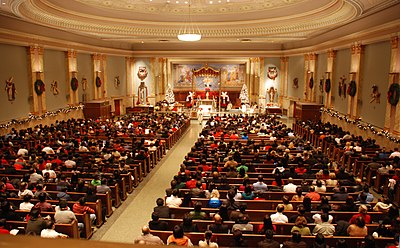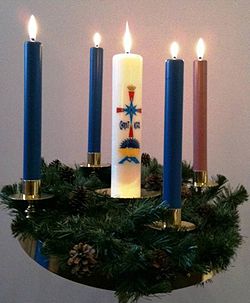

This article needs additional citations for verification. Please help improve this articlebyadding citations to reliable sources. Unsourced material may be challenged and removed.
Find sources: "Midnight Mass" – news · newspapers · books · scholar · JSTOR (March 2023) (Learn how and when to remove this message) |

In many Western Christian traditions, Midnight Mass is the first liturgyofChristmastide that is celebrated on the night of Christmas Eve, traditionally beginning at midnight when Christmas Eve gives way to Christmas Day. This popular Christmas custom is a jubilant celebration of the massorservice of worship in honour of the Nativity of Jesus; even many of those Christian denominations that do not regularly employ the word mass uniquely use the term "Midnight Mass" for their Christmas Eve liturgy as it includes the celebration of Holy Communion.[citation needed]
The tradition of a midnight Vigil on the eve of Christmas began in the East, and was observed in the late fourth century in Jerusalem by a Christian woman named Egeria on the night of January 5. The tradition reached the Western world in the year 430 under Pope Sixtus III in the Basilica of St Mary Major.[1]
By the twelfth century, the practice of midnight Mass had become more widespread as all priests had been granted the faculty of celebrating three Masses on Christmas Day (previously reserved to the Pope), provided the three different propers were celebrated at their appropriate times of midnight, dawn and day.[1]

Roman Catholics have traditionally celebrated Midnight Mass with church services beginning at midnight. Since 2009 the Vatican has conducted a liturgically similar Christmas Eve Mass earlier in the day, first at 10:00 pm,[2] designated a Mass during the Night, then subsequently earlier in the evening.
In Splendoribus Sanctorum is used for the Communion chant during traditional Catholic midnight mass.
Lutherans often observe Midnight Mass in addition to Christmas Vespers and Matins. In his famous work, Cérémonies et coutumes religieuses de tous les peuples du monde, Bernard Picart describes the Lutheran Midnight Mass:
In some Lutheran Countries, the People go to Church on the Night of the Nativity of our Blessed Saviour with lighted Candles, or Wax-Tapers in their Hands. The Faithful who are met together in the Church, spend the whole Night there in singing, and saying their Prayers by the Light of them. Sometimes they burn such a large Quantity of Incense, that the Smoke thereof ascends in the Form of a Whirlwind, and their Devotees may properly enough be said to be wrapt up in it.[3]
Churches of the Anglican Communion also traditionally celebrate Midnight Communion for Christmas at 11 or 11:30 pm.
Methodist observations vary as many hold services at 11 p.m. which involve the ringing of church bells when the stroke of midnight is reached.
The Church of Scotland observes a service just before midnight which involves the singing of carols, although it does not include Mass and is called a watchnight service (held elsewhere on New Year's Eve).
While Midnight Mass is not observed in Eastern traditions, All-Night Vigil is common on Christmas Eve and involves the celebration of Matins, the hour which is traditionally observed at midnight.
|
Liturgical year of the Catholic Church
| |||||||||||||||||||||||||||
|---|---|---|---|---|---|---|---|---|---|---|---|---|---|---|---|---|---|---|---|---|---|---|---|---|---|---|---|
| |||||||||||||||||||||||||||
| |||||||||||||||||||||||||||
| |||||||||||||||||||||||||||
|
| ||||||||
|---|---|---|---|---|---|---|---|---|
| People |
| |||||||
| Place |
| |||||||
| Gifts of the Magi |
| |||||||
| Narratives |
| |||||||
| Related |
| |||||||
| In culture |
| |||||||
| Remembrances |
| |||||||